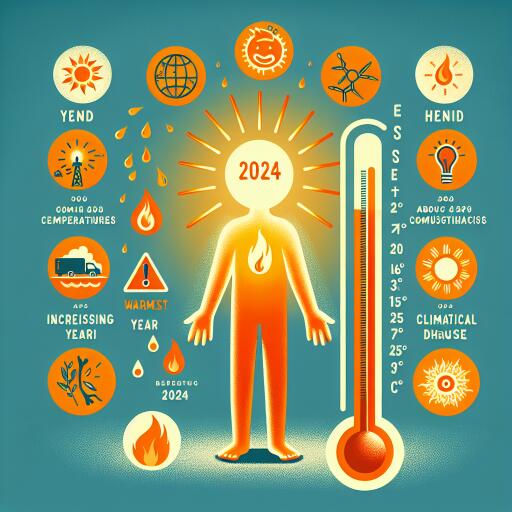
2024 ‘Almost Certain’ to be Warmest Year and First Above 1.5 Degree Celsius
The climate narrative reaches a critical juncture as 2024 is poised to become the warmest year on historical record, breaking new ground by being the first year to exceed an average temperature rise of 1.5 degrees Celsius since the pre-industrial era. This significant announcement follows what has been recorded as the second-warmest October across the globe, according to data insights released by a leading European climate monitoring agency.
This alarming declaration comes at a pivotal time, just ahead of the United Nations climate conference slated to commence on November 11 in Baku, Azerbaijan. The urgency of the moment will focus on bolstering climate finance, especially as developed nations are called upon to aid developing countries in their climate adaptation and mitigation efforts beginning in 2025.
“Following ten intense months of monitoring in 2024, it is virtually assured that this year will eclipse past temperature records, likely surpassing the significant 1.5-degree Celsius mark above pre-industrial levels,” stated a high-ranking official from the climate agency. “The implications are profound and must act as a catalyst for decisive action at the COP29 climate conference.”
Climate scientists have noted that October’s temperatures have reached unprecedented levels, closely trailing those of the previous year. October 2024 saw global temperatures averaging at 15.25 degrees Celsius, which is 0.80 degrees Celsius higher than the typical October values recorded between 1991-2020. Analyzing January through October, this year’s average global temperature soared 0.71 degrees Celsius above that historical average, marking it as the warmest on record thus far, and exceeding the same period in 2023 by 0.16 degrees Celsius.
Given that 2023 recorded a temperature rise of 1.48 degrees Celsius above pre-industrial levels, the climatic trajectory indicates that 2024 may likely exceed the critical 1.5-degree threshold, potentially surpassing 1.55 degrees Celsius.
The Paris Agreement of 2015 represents a global commitment by nations to restrict the average temperature rise to 1.5 degrees Celsius above pre-industrial levels, to stave off the most severe consequences of climate change. However, a sustained breach of this 1.5-degree target refers to ongoing warming trends observed over decades. Currently, Earth’s surface temperature has escalated by approximately 1.2 degrees Celsius since the late 19th century, attributed primarily to escalating concentrations of greenhouse gases, notably carbon dioxide and methane.
These temperature surges are increasingly identified as central drivers behind a series of extreme weather events worldwide, including record-breaking droughts, massive wildfires, and devastating floods. Recent climate assessments reveal that temperatures were anomalously high not only across Europe and northern Canada but also markedly elevated in the central and western regions of the United States, the northern areas of Tibet, and nations like Japan and Australia.
In India, October 2024 stood out for anomalous warmth, registering the highest temperatures since record-keeping began in 1901, exceeding average levels by 1.23 degrees Celsius. The forecast for November indicates a continuation of this warming trend, with above-normal temperatures anticipated.
The impending escalation in global temperatures underscores an urgent call to action for policymakers, industries, and citizens worldwide. It is imperative that the forthcoming climate conference translates scientific warnings into robust, scalable, and equitable measures that both curb emissions and strengthen resilience to the growing threats posed by climate change.
The intertwined challenges of climate imperatives demand coherent, cooperative global strategies that not only target the reduction of current greenhouse gas emissions but also encapsulate the equitable distribution of resources and technology to foster sustainable development.





Leave a Reply